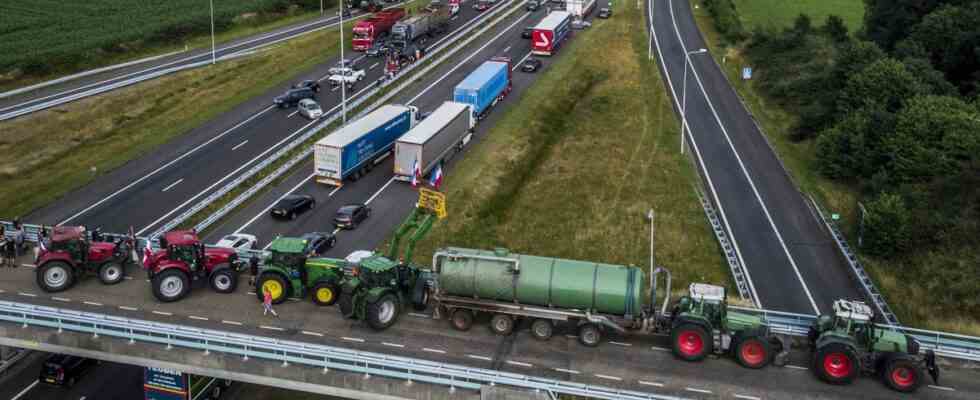The bad peasants came late in the evening. They broke through a barrier in front of the house of Dutch Minister Christianne van der Wal on Tuesday, damaged police cars and sprayed a tank full of liquid manure. The right-wing liberal politician was not present, but her family. At the same time, others moved in front of MP Derk Boswijk’s house. His two small children felt threatened the Christian Democrat will stay with them for the time being and will not go to work in The Hague.
Militant farmers have been protesting against new environmental regulations for days. They block the freeways with their tractors, cause long traffic jams, set fire to bales of hay on the side of the road, pull in hundreds in front of government buildings in the provinces and also in The Hague. Politicians are following the events with growing indignation. Prime Minister Mark Rutte said on Wednesday on the sidelines of the NATO summit in Madrid that he had seen horrific images. “This behavior goes beyond all limits.”
It’s been three weeks since Van der Wal, who held the post of “Minister for Nature and Nitrogen” that was only created for this purpose in January, published their plan, how to finally tackle the nitrate problem. There is too much of it and it is bad for the environment.
In some areas, pig density is the highest in the world
Nature reserves and especially moorland are suffering, and biodiversity has been falling for decades. And that is mainly due to the intensive livestock farming in the Netherlands, which is responsible for about 70 percent of man-made inputs of nitrogen compounds. Live in some southern areas more pigs per square meter than anywhere else in the world.
The solution – fewer animals – is obvious. It has been considered for years, now the minister wants and needs to get serious about it. By 2030, nitrogen emissions in 74 percent of the nature reserves are to be reduced below the limit values specified by the EU, so far there have been 24. Van der Wal has set reduction targets of up to 70 percent for the twelve provinces; who does not sprint, can be forced. According to experts, this means that farmers have to reduce their emissions by around half.
The government leaves open how this is to be achieved. You could pay the farmers money to give up their farms. This happens, but not often enough, and costs a lot. It is also conceivable to keep a lot fewer animals on a larger area – which is not worthwhile for many farmers. What they like best is the idea of limiting emissions through innovations such as stall and exhaust technology. However, scientists warn that this is not enough and that the money invested could end up being wasted.
“I know that this has enormous consequences for farmers who have been living in insecurity for a long time,” Van der Wal justified her plan in Parliament. “It’s terrible. At the same time, we have no other choice. Nature can’t wait.” The farmers, however, do not want to give in.
It has become increasingly clear over the years that the conflict is inevitable. On the one hand there is agriculture, the pride of the Dutch economy, not only technically at the forefront of the world, but also quantitatively: The Netherlands, smaller than Lower Saxony and densely populated, are the second largest agricultural exporter in the world after the USA.
The farmers believe that others are also to blame: consumers, slaughterhouses, banks
On the other hand there is the environment, at the expense of which this production is carried out. Almost half of the land is used for agriculture, and because it is scarce, cultivation has had to become more and more efficient and intensive in order to get the most out of every square meter. What the factory farming produces, based on imported concentrated feed, exceeds the domestic demand many times over. What can hardly be exported are the waste products: ammonia from manure, which pollutes the air, and, in the form of nitrate, soil and water.
For decades, the problem was ignored, with the help of the peasant lobby and, above all, Christian Democratic leaders. In 2019 it was finally the judiciary that put an end to this. The Raad van State, the highest administrative court instance, rejected the current but ineffective system for issuing nitrogen licenses and obliged the authorities to actually do in future what they only pretended to do until then: comply with the limit values of the EU nature conservation directive.
The verdict had serious consequences, and the “nitrate crisis” broke out. After a politician called for a radical reduction in livestock, farmers went on the barricades for the first time at the end of 2019. Housing construction came to an abrupt halt because it also causes nitrogen inputs. As an immediate measure, 100 km/h was ordered on the motorways, but the problem remained and was only postponed during the Corona crisis.
Van der Wal’s statements confirm the farmers’ feeling that they alone are the scapegoats. What about consumers, they ask, who have always been able to buy cheap meat? What about the feed traders, the manufacturers of fertilizers and pesticides, the slaughterhouses, the banks, all of whom make money from the system?
Such thoughts resonate in the media, and comments warn that society should not take the easy way out of solving the problem. But politics wants to remain tough. The majority of Parliament supports the minister’s plan.

